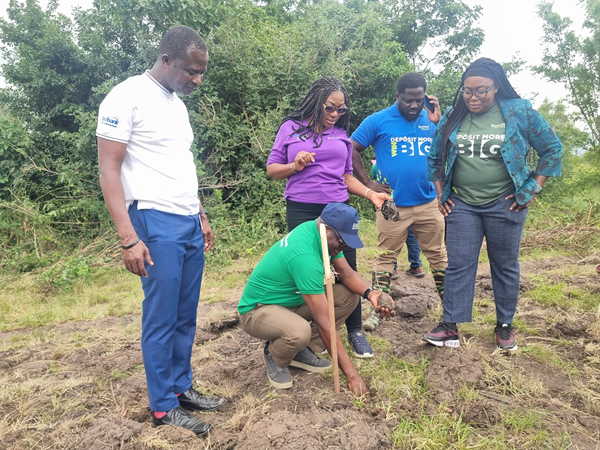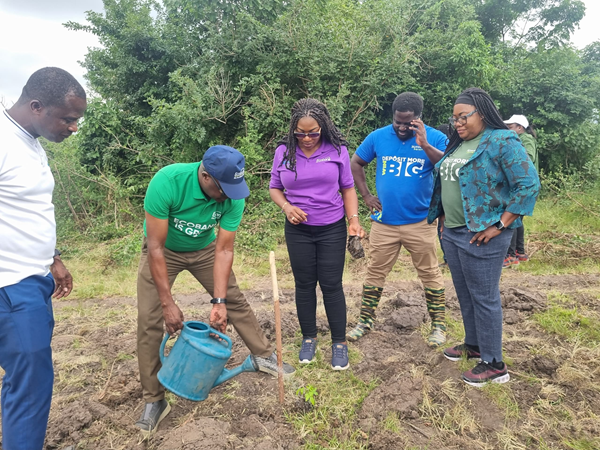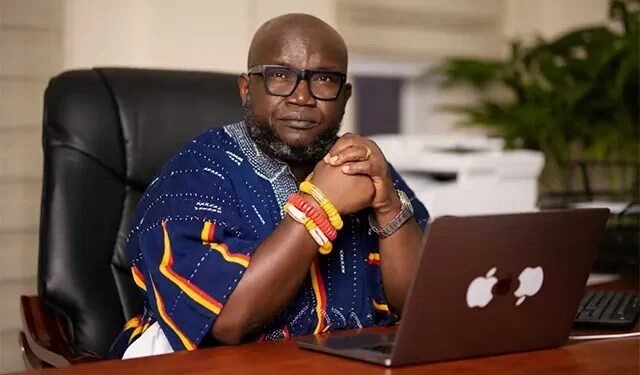In a bold move towards environmental sustainability, Ecobank Ghana has launched a significant reforestation project in the Chipa Forest Reserve, located in the Shai-Osudoku District of the Greater Accra Region.
The initiative marks a new chapter in the bank’s ongoing commitment to preserving the environment.
Dr. Daniel Kasser Tee, the Head of Corporate Communications for Ecobank Ghana and Anglophone West Africa (AWA), announced the initiative on behalf of Mr. Tara Squire, Executive Director and Regional Head of Consumer Banking at Ecobank Ghana/AWA. The project aims to plant approximately 1,700 trees on a 2-hectare degraded land within the forest reserve.
The event, held on July 25, 2025 was the culmination of Ecobank Ghana’s 2025 World Environment Day series of events. This initiative is part of the bank’s longstanding partnership with the Forestry Commission, dating from 2013, which has traditionally involved the mobilisation of Ecobank employees annually to plant trees in schools across Ghana.
Dr. Kasser Tee emphasized the importance of sustainability and impact in the bank’s greening efforts, indicating that: “To ensure that what we do, going forward, is sustainable and more impactful, we decided to broaden our scope this year by adopting degraded lands for reforestation.”
He mentioned that Ecobank, in June participated in several key events, including the official launch and commemorative tree planting at Kwabenya Community SHS, a special tree planting programme at the Achimota Forest Reserve, which involved members of the Diplomatic Corps and Heads of selected Institutions, and the planting of 2,800 trees in 27 schools and hospitals across five regions of Ghana.
Dr. Kasser Tee highlighted the numerous benefits of reforestation on degraded lands, including improving ecosystems by providing habitats for various species, enhancing soil structure and fertility, and regulating climate by absorbing carbon dioxide and releasing oxygen. He also emphasized the economic value through job creation and improved living standards in deprived communities, as well as the aesthetic and recreational benefits that also promote tourism.
He further mentioned that a single mature tree has the remarkable ability to supply enough oxygen in one day to support up to four individuals. A healthy tree can also absorb as much as 13 pounds of carbon each year, making it an invaluable ally in the fight against climate change.
Recognizing these vital contributions of trees to the environment, Ecobank Ghana has wholeheartedly adopted tree planting initiatives as part of its commitment to combat environmental degradation. The bank is also actively working to reduce the carbon footprint of its operations, which includes its supply and procurement processes, building designs, and energy usage.
Dr. Kasser Tee concluded by reiterating the point that tree planting must be a priority for every Ghanaian.
“At the individual level, people may not have the capacity for large afforestation or reforestation projects, but each person can, at least, plant one tree every year. With an adult population of about 60%, whether using 15+ or 18+ years as the base, Ghana could boast of planting 20.8 million trees annually from its estimated population of 34.7 million.” This, in his view, would be a huge contribution to restoring the fast-degrading forest to its natural form, and thereby, building a congenial environment for the future.
Mrs Linda Zuri Ansah, the Tema District Manager of the Forestry Commission, explained that the Commission is working to partner with farmers in the catchment area of the forest under the “tonja system,” which is a 60/40 profit-sharing arrangement. Farmers, under the system, commit to caring for the planted seedlings while also having the opportunity to plant food crops for themselves. Whenever the trees are sufficiently grown and are harvested, the Commission will keep 60% of the sales proceeds while the farmer gets the remaining 40%. This brings a second income line to the farmers, besides what they get from their crops.
She expressed her gratitude to Ecobank for the partnership with the Commission to help restore the degraded forest.
Linda also took the opportunity to invite other companies to emulate the good works of Ecobank by making contributions to support the drive to salvaging the nation’s fast-depleting forests.




